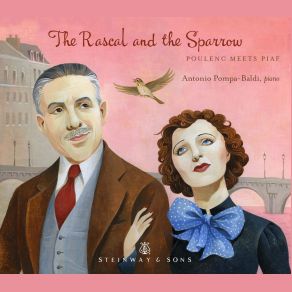The Rascal and the Sparrow: Poulenc Meets Piaf
Download links and information about The Rascal and the Sparrow: Poulenc Meets Piaf by Antonio Pompa-Baldi. This album was released in 2013 and it belongs to Rock genres. It contains 27 tracks with total duration of 01:07:26 minutes.

|
|
|---|---|
| Artist: | Antonio Pompa-Baldi |
| Release date: | 2013 |
| Genre: | Rock |
| Tracks: | 27 |
| Duration: | 01:07:26 |
| Buy it NOW at: | |
| Buy on iTunes $9.99 | |
| Buy on Amazon $8.99 | |
Tracks
[Edit]| No. | Title | Length |
|---|---|---|
| 1. | Léocadia, FP 106: Les chemins de l'amour (arr. A. Pompa-Baldi for piano) | 3:32 |
| 2. | Improvisations: No. 15 in C Minor, "Hommage à Édith Piaf" | 3:24 |
| 3. | Hymne à l'amour (arr. A. Pompa-Baldi for piano) | 3:10 |
| 4. | Rosemonde, FP 158 (arr. A. Pompa-Baldi for piano) | 1:50 |
| 5. | Un grand amour qui s'achève (arr. A. Pompa-Baldi for piano) | 4:03 |
| 6. | 5 Poèmes de Max Jacob, FP 59: No. IV. Berceuse (arr. A. Pompa-Baldi for piano) | 1:43 |
| 7. | Métamorphoses, FP 121: No. I. Reine des mouettes (arr. A. Pompa-Baldi for piano) | 1:19 |
| 8. | Métamorphoses, FP 121: No. II. C'est ainsi que tu es (arr. A. Pompa-Baldi for piano) | 2:28 |
| 9. | La Vie en rose (arr. A. Pompa-Baldi for piano) | 2:06 |
| 10. | Les amants d'un jour (arr. A. Pompa-Baldi for piano) | 2:51 |
| 11. | 2 Poèmes de Louis Aragon, FP 122: No. I. C (arr. A. Pompa-Baldi for piano) | 2:51 |
| 12. | L'homme aux mains d'argile: Paris (arr. A. Pompa-Baldi for piano) | 2:45 |
| 13. | Je sais comment (arr. A. Pompa-Baldi for piano) | 4:07 |
| 14. | 2 mélodies sur des poèmes de Guillaume Apollinaire, FP 131: No. I. Le pont (arr. A. Pompa-Baldi for piano) | 2:26 |
| 15. | Mon légionnaire (arr. A. Pompa-Baldi for piano) | 2:52 |
| 16. | Tel jour, telle nuit, FP 86: No. VII. Je n'ai envie que de t'aimer (arr. A. Pompa-Baldi for piano) | 1:33 |
| 17. | C'est à Hamburg (arr. A. Pompa-Baldi for piano) | 3:14 |
| 18. | Chansons gaillardes, FP 42: No. V. Couplets bachiques (arr. A. Pompa-Baldi for piano) | 1:28 |
| 19. | Nos souvenirs chantent, FP 182 (arr. A. Pompa-Baldi for piano) | 3:48 |
| 20. | Non, je ne regrette rien (arr. A. Pompa-Baldi for piano) | 4:17 |
| 21. | Mon Dieu (arr. A. Pompa-Baldi for piano) | 2:52 |
| 22. | 8 Chansons polonaises, FP 69: No. II. Odjazd. Le départ (arr. A. Pompa-Baldi for piano) | 0:56 |
| 23. | 8 Chansons polonaises, FP 69: No. IV. Ostatni mazur. Le dernier mazour (arr. A. Pompa-Baldi for piano) | 1:42 |
| 24. | Poèmes de Ronsard, FP 38: No. I. Attributs (arr. A. Pompa-Baldi for piano) | 1:15 |
| 25. | Montparnasse, FP 127 (arr. A. Pompa-Baldi for piano) | 3:08 |
| 26. | Hyde Park, FP 128 (arr. A. Pompa-Baldi for piano) | 0:49 |
| 27. | Parisiana, FP 157: No. II. Vous n’écrivez plus? (arr. A. Pompa-Baldi for piano) | 0:57 |
Details
[Edit]The contents of this little release are pretty much what the title suggests: what you get are piano versions of songs by Francis Poulenc and the French pop vocalist Édith Piaf. This sounds a bit contrived, but it works well for several reasons. First, Poulenc entitled one of his short piano pieces "Hommage à Édith Piaf," and the two might have met; they certainly had the filmmaker Jean Cocteau as a mutual friend. Second, there's more than a bit of French popular song in Poulenc, especially in the harmonies of his songs. Third, you might compare, as annotator Damian Fowler does in the booklet notes, the melancholy tone of Piaf's songs with a certain layer of Poulenc's music resulting from frustrations due to his status as a gay man. Fourth, and most important, the stylistic boundary is intentionally blurred. For Poulenc what you get are basically transcriptions; these are done by the pianist, Antonio Pompa-Baldi, himself. But for Piaf you get "elaborations;" these are by Roberto Piana. These are harmonically denser than the originals but retain their emotional flavor. They might be compared to George Gershwin's instrumental Song-Book, mostly minus the jazz, and they're intriguing at the very least because no one else has done anything much like them before. The concept is perfectly well executed by Pompa-Baldi. It's the kind of thing that surely depends on whether you accept the basic emotional equation. But try it; you might like it.